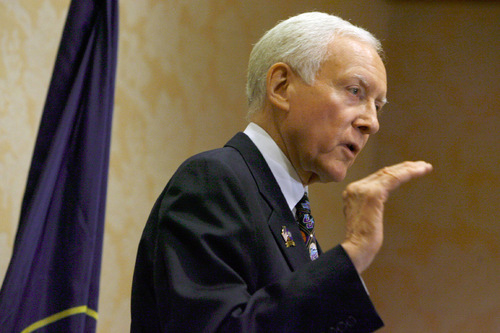This is an archived article that was published on sltrib.com in 2011, and information in the article may be outdated. It is provided only for personal research purposes and may not be reprinted.
Washington • Rep. Jason Chaffetz claims that Sen. Orrin Hatch is trying to scare away his potential campaign donors, making it more difficult to raise money as he considers a run against the senator in 2012.
"He has been more direct in telling people 'don't you dare donate. I'm watching,' " Chaffetz told The Salt Lake Tribune.
Hatch's campaign chief not only was dismissive of the charge, he flat-out denied it.
"This idea that the senator is putting a crimp on his fundraising is ludicrous," said Dave Hansen, the senator's campaign manager. "What is the congressman going to accuse us of next, the NFL lockout?"
Where the truth lies is hard to determine with donors wary of talking publicly for fear of hurting their relationship with Hatch. Chaffetz said he could not identify a donor willing to corroborate his assertion.
But what is clear is that Hatch, a six-term senator, will maintain a massive financial advantage in any potential showdown with Chaffetz or state Sen. Dan Liljenquist, who is also considering a run against Hatch.
"I have not experienced that because I am not actively fundraising," Liljenquist said. "But the senator could wield a good deal of influence if he wanted to use it."
Hatch holds a powerful perch on the Finance Committee, attracting donations from the financial industry and the health care sector. He's also the state's most prolific fundraiser, scooping up $780,000 in the first three months of the year. He has $2.5 million in the bank.
Chaffetz, a two-term House member, raised $115,000 from January to March, the most recent reporting period, and that left him with $180,000 in the bank. He has made no secret of his interest in running against Hatch but has said he would make no formal decision until after Labor Day.
One way Chaffetz or Liljenquist may be able to narrow the disadvantage is with the help of tea party-affiliated groups that have announced their opposition to Hatch, such as FreedomWorks and the Club for Growth.
These groups spent heavily to defeat then-Sen. Bob Bennett in 2010 and are now targeting Hatch, claiming he is not conservative enough.
FreedomWorks is set to launch its offensive against Hatch at the state Republican Convention this Saturday, handing out fliers attacking the senator's record on past debt ceilings and his vote on the initial Troubled Asset Relief Program.
Russ Walker, FreedomWorks' point man for the Hatch campaign, says he has met with Chaffetz and Liljenquist and is "pleased" with both of the potential challengers. He promised an independent direct mail campaign and possibly TV or radio ads.
The Club for Growth's President Chris Chocola urged Chaffetz to run at the start of the month and promised that he would have "the full support of the Club for Growth PAC and our 55,000 members."
Hansen reacted to the FreedomWork's campaign by saying: "Senator Hatch is committed to running a hard campaign based on the issues and the future of our country. His focus is on the ideas and values of Utahns throughout the state, not on the actions of out-of-state interest groups."
Hatch's campaign also released an endorsement letter it received from C. Boyden Gray, former U.S. ambassador and White House counsel, who is a member of FreedomWorks' foundation board complimenting the senator on his work on the Judiciary Committee.
While these tea-party groups take aim at Hatch, just as they did Bennett, Chaffetz is making frequent political appearances in areas of Utah that fall far outside his congressional district. He has also tried to ramp up his fundraising and created a political action committee so he could give to fellow Republicans.
Chaffetz said Hatch "has never been helpful" on the fundraising side, though the senator's political action committee, OrrinPac, gave him $10,000 for his re-election bid last year.
"I'm still doing well and I have plenty of resources," Chaffetz said. "I don't need millions of dollars to win a race."
To get the Republican nomination in Utah, a candidate can either persuade 60 percent of delegates to support him at next year's state GOP convention or, if no candidate reaches that threshold, the top two face off in a June primary.
Hatch vs. Chaffetz
R Six-term Sen. Orrin Hatch had $2.5 million in his campaign account at last count in March. That compares with just $180,000 for Rep. Jason Chaffetz, who is considering challenging Hatch. Chaffetz accuses Hatch of trying to sabotage his fundraising efforts — a charge Hatch's campaign denies. But Chaffetz says he doesn't need millions to defeat the state's longest-serving senator because of the state's grass-roots, convention-based nominating process.





